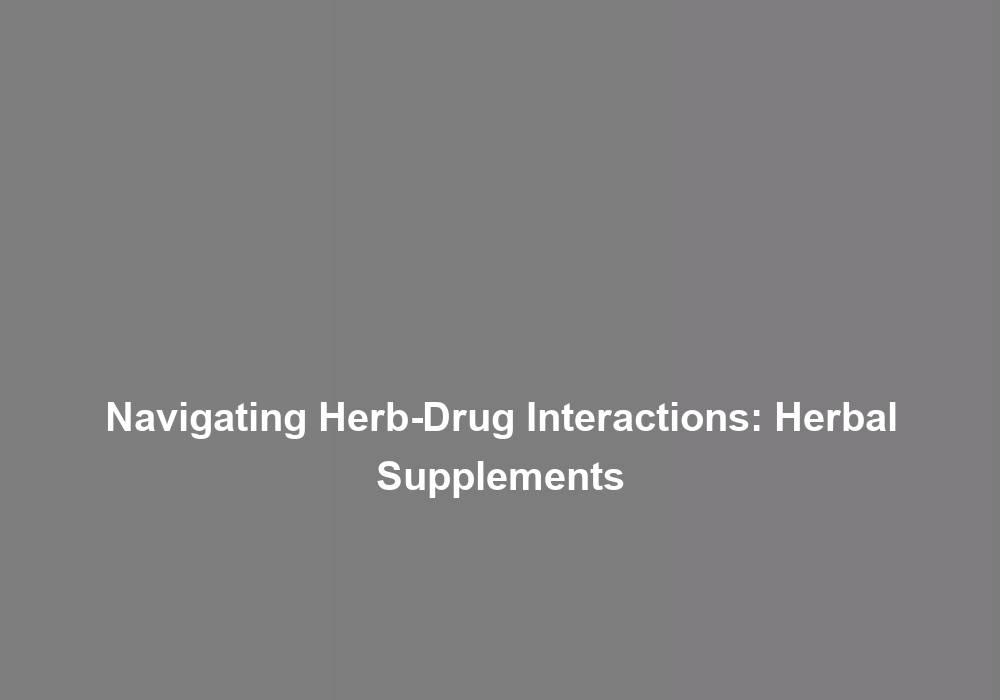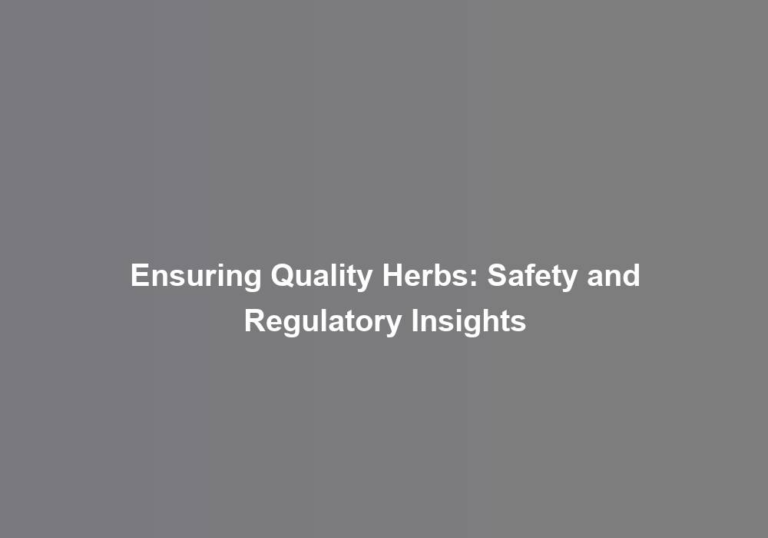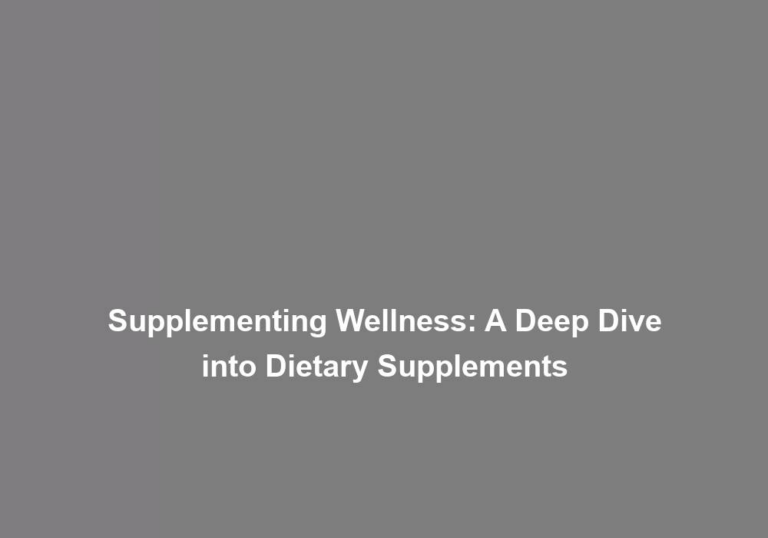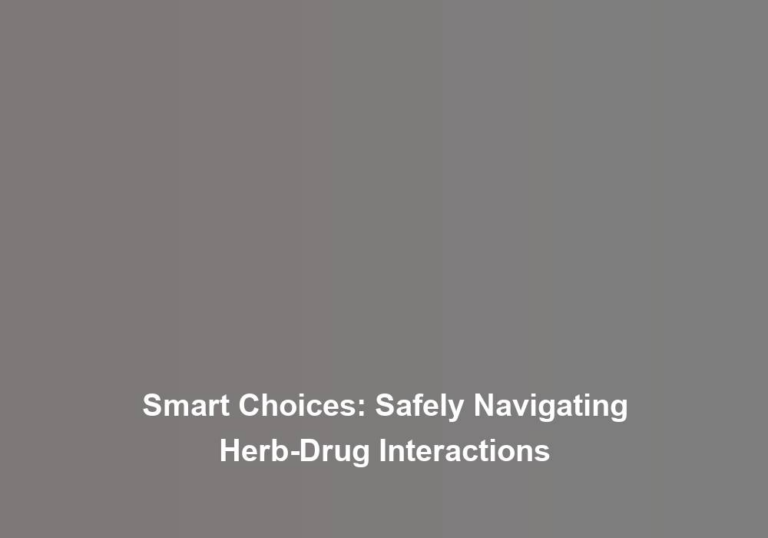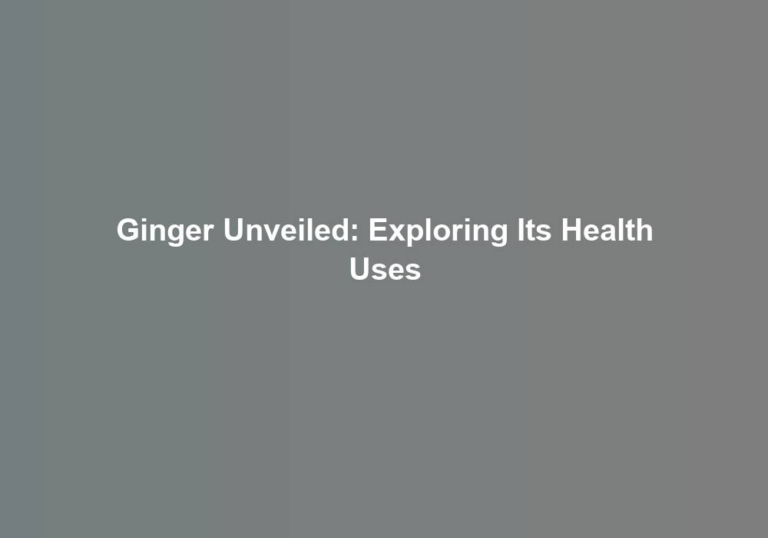Navigating Herb-Drug Interactions: Herbal Supplements
You may think that taking herbal supplements is a harmless addition to your health routine, but when it comes to potential interactions with prescription medications, the stakes are higher than you might realize. Navigating herb-drug interactions can be a complex and crucial aspect of managing your health, and itG??s essential to have a solid understanding of the potential risks and benefits. Whether youG??re a long-time user of herbal supplements or just considering incorporating them into your regimen, itG??s important to be aware of how they can impact the effectiveness and safety of your medications. As you explore this topic, youG??ll gain valuable insights into managing herb-drug interactions and ensuring the best possible outcomes for your health and well-being.
Importance of Understanding Interactions
Understanding the importance of herb-drug interactions is crucial for ensuring the safe and effective use of herbal supplements. The implications of these interactions can have significant effects on an individualG??s health, making it essential for healthcare education to cover this topic thoroughly. Risk assessment plays a vital role in identifying potential interactions between herbs and conventional medications. It is imperative for healthcare professionals to be equipped with the necessary knowledge and tools to assess these risks and communicate them effectively to patients.
Healthcare education on herb-drug interactions should incorporate comprehensive risk assessment strategies. This includes understanding the potential pharmacokinetic and pharmacodynamic interactions that can occur between herbs and drugs. Additionally, communication strategies should be emphasized to ensure that healthcare providers can effectively convey the risks and benefits of combining herbal supplements with prescription medications to their patients. This communication should be tailored to the individual patient, considering their specific health status and medication regimen.
Common Herb-Drug Interactions
You need to be aware of potential herb-drug interactions, especially when you are using herbal supplements alongside prescribed medications. ItG??s important to assess the risk of these interactions, considering factors such as the specific herbs and drugs involved, as well as individual health conditions. Communicating openly with your healthcare provider about your use of herbal supplements and prescription drugs is crucial for managing potential interactions and ensuring your overall well-being.
Potential Interactions
Common herb-drug interactions can have significant impacts on the effectiveness and safety of medications and herbal supplements. ItG??s important to be aware of potential risks associated with combining herbal remedies and prescription drugs. Here are some common herb-drug interactions to consider:
- St.-?JohnG??s Wort and selective serotonin reuptake inhibitors (SSRIs) can lead to serotonin syndrome, causing confusion and agitation.
- Garlic supplements may interact with blood-thinning medications, increasing the risk of bleeding.
- Ginkgo biloba can interfere with blood pressure medications, potentially leading to abnormal blood pressure levels.
- Echinacea might affect the breakdown of certain drugs in the liver, impacting their effectiveness.
- Ginseng could interact with diabetes medications, affecting blood sugar levels.
Being mindful of these interactions is crucial to ensure the safe and effective use of both herbal supplements and prescription medications.
Risk Assessment
Considering the potential interactions between herbal supplements and prescription medications, it is essential to assess the risks associated with common herb-drug interactions to ensure their safe and effective use. Risk assessment involves evaluating the likelihood and severity of interactions between specific herbs and drugs. By understanding these risks, you can make informed decisions about their combined use. Here is a table to help you navigate some common herb-drug interactions:
| Herb | Medication | Potential Interaction |
|---|---|---|
| St.-?JohnG??s Wort | Antidepressants | Reduced drug effectiveness |
| Garlic | Warfarin | Increased risk of bleeding |
| Ginkgo Biloba | Aspirin | Increased risk of bleeding |
Careful risk assessment is crucial for herbal safety when using these supplements alongside prescription medications. Always consult with a healthcare professional before combining herbal supplements with any prescribed drugs.
Communication With Healthcare
Effective communication with healthcare professionals is essential to ensure the safe and informed use of herbal supplements in conjunction with prescription medications. When discussing herb-drug interactions with your healthcare provider, itG??s important to:
- Be open and honest about all the supplements and medications you are currently taking to receive personalized healthcare guidance.
- Seek patient education from your healthcare provider about potential herb-drug interactions and their impact on your treatment plan.
- Ask questions and seek clarification on any concerns or doubts you may have regarding the use of herbal supplements alongside prescription medications.
- Share any changes in your supplement regimen with your healthcare provider to ensure ongoing safety and effectiveness of your treatment.
- Collaborate with your healthcare team to develop a comprehensive plan that integrates herbal supplements and prescription medications safely and effectively.
Impact on Health and Medication Efficacy
Herb-drug interactions can pose significant health risks and impact the efficacy of medications. Understanding the potential interactions between herbal supplements and prescription drugs is crucial for maintaining your health and ensuring the effectiveness of your treatment. ItG??s important to be informed about the possible effects of combining herbs and medications to make well-informed decisions about your healthcare.
Health Risks
When incorporating herbal supplements into your health regimen, it is crucial to be aware of the potential risks they pose to your health and the efficacy of your medications. Here are some key health risks to consider:
- Interference with Medications: Herbal supplements can interact with prescription drugs, leading to reduced efficacy or adverse effects.
- Allergic Reactions: Some individuals may experience allergic reactions to certain herbal supplements, causing skin rashes, itching, or respiratory issues.
- Toxicity: Certain herbs, when taken in high doses or for prolonged periods, can lead to toxicity and harm your health.
- Effect on Chronic Conditions: Herbal supplements can impact chronic health conditions such as diabetes, hypertension, or thyroid disorders.
- Contamination: Herbal products may be contaminated with harmful substances, posing serious health risks.
Understanding these risks and consulting with a healthcare professional is essential for a comprehensive risk assessment and to mitigate potential health implications.
Drug Interactions
Considering potential interactions between herbal supplements and prescription medications is essential for understanding their impact on your health and the efficacy of your medication. Understanding implications of herb-drug interactions requires navigating complexities and employing effective communication strategies with healthcare providers. Risk assessment plays a crucial role in evaluating the potential for interactions, as some herbal supplements can either amplify or diminish the effects of prescription medications. The complexity of drug interactions necessitates open and honest communication with your healthcare team. ItG??s important to disclose all herbal supplements and medications you are taking to ensure a comprehensive assessment of potential interactions. By being proactive in discussing herb-drug interactions, you can help safeguard your health and maximize the efficacy of your prescribed medications.
Safety Guidelines for Herbal Supplement Use
For safe use of herbal supplements, it is important to follow established safety guidelines and recommendations. When incorporating herbal remedies into your health regimen, itG??s essential to prioritize safety precautions to ensure the best possible outcomes. Here are some key safety guidelines to consider:
- Consult a healthcare professional: Before starting any natural supplements, seek advice from a qualified healthcare provider who can offer personalized recommendations based on your medical history and current medications.
- Research potential risks: Take the time to educate yourself about the potential risks and side effects associated with specific herbal supplements. Being well-informed can help you make safer and more effective choices.
- Purchase from reputable sources: To minimize the risk of contamination or adulteration, only purchase herbal products from trusted and reputable sources that adhere to quality standards.
- Follow dosage instructions: Adhere strictly to the recommended dosage on the product label or as advised by your healthcare provider. Avoid the misconception that G??more is better,G?? as excessive intake can lead to adverse effects.
- Monitor for interactions: Keep an eye out for any interactions between herbal supplements and prescription medications. Be proactive in communicating any changes in your supplement regimen to your healthcare provider to prevent potential adverse effects.
Consulting Healthcare Professionals
To ensure the safe and effective incorporation of herbal supplements into your health regimen, consulting a qualified healthcare professional is essential to receive personalized recommendations and guidance based on your individual medical history and current medications. Healthcare guidance from a professional can help you navigate potential interactions between herbal supplements and prescription medications, as well as provide insight into the appropriate dosage and duration of use. Professional advice also takes into account any underlying health conditions or specific concerns you may have, ensuring that the herbal supplements complement your overall healthcare plan.
A healthcare professional, such as a physician, pharmacist, or registered dietitian, can offer evidence-based recommendations on the selection of herbal supplements, taking into consideration any potential contraindications with your current medications or health conditions. This personalized approach is crucial, as it helps minimize the risk of adverse effects or interference with the efficacy of your prescribed treatments. Additionally, seeking professional advice fosters a collaborative healthcare environment, where you are actively involved in making informed decisions about incorporating herbal supplements into your wellness routine.
Furthermore, a healthcare professional can monitor your progress and make any necessary adjustments to your herbal supplement regimen based on your response and any changes in your medical status. This ongoing support and guidance from a qualified professional contribute to the safe and effective integration of herbal supplements into your overall healthcare plan, promoting a holistic approach to wellness. Therefore, seeking healthcare guidance and professional advice is an integral part of optimizing the benefits of herbal supplements while prioritizing your health and safety.
Managing Herb-Drug Interactions
How do herbal supplements interact with prescription medications and what are the strategies for managing these interactions? ItG??s essential to be mindful of potential herb-drug interactions to ensure your safety and well-being. Here are some key strategies for managing these interactions:
-
Consult a Healthcare Professional: Seeking advice from a healthcare provider is crucial in managing the risks associated with herb-drug interactions. They can provide personalized recommendations based on your specific health conditions and medication regimen, helping you navigate potential risks effectively.
-
Disclose All Medications and Supplements: Communicate openly with your healthcare provider about all the herbal remedies and prescription medications you are taking. This transparency allows them to evaluate potential interactions and make informed decisions regarding your treatment plan.
-
Evaluate Effectiveness of Natural Remedies: ItG??s important to critically evaluate the effectiveness of natural remedies and their potential interactions with prescription medications. Understanding the scientific evidence behind herbal supplements can help you make informed choices and minimize risks.
-
Follow Recommended Dosages: Adhering to recommended dosages for both prescription medications and herbal remedies is essential for managing interactions. Avoiding excessive intake of supplements can help prevent adverse effects and minimize the likelihood of interactions.
-
Stay Informed: Keep yourself updated on the latest research and information regarding herb-drug interactions. Staying informed empowers you to make educated decisions about your health and well-being.
Conclusion
In conclusion, understanding herb-drug interactions is crucial for your health and medication efficacy. By recognizing common interactions and following safety guidelines for herbal supplement use, you can better manage potential risks. Consulting healthcare professionals for personalized advice is key in navigating these interactions. Stay informed, stay safe, and prioritize your health when it comes to herbal supplements.

